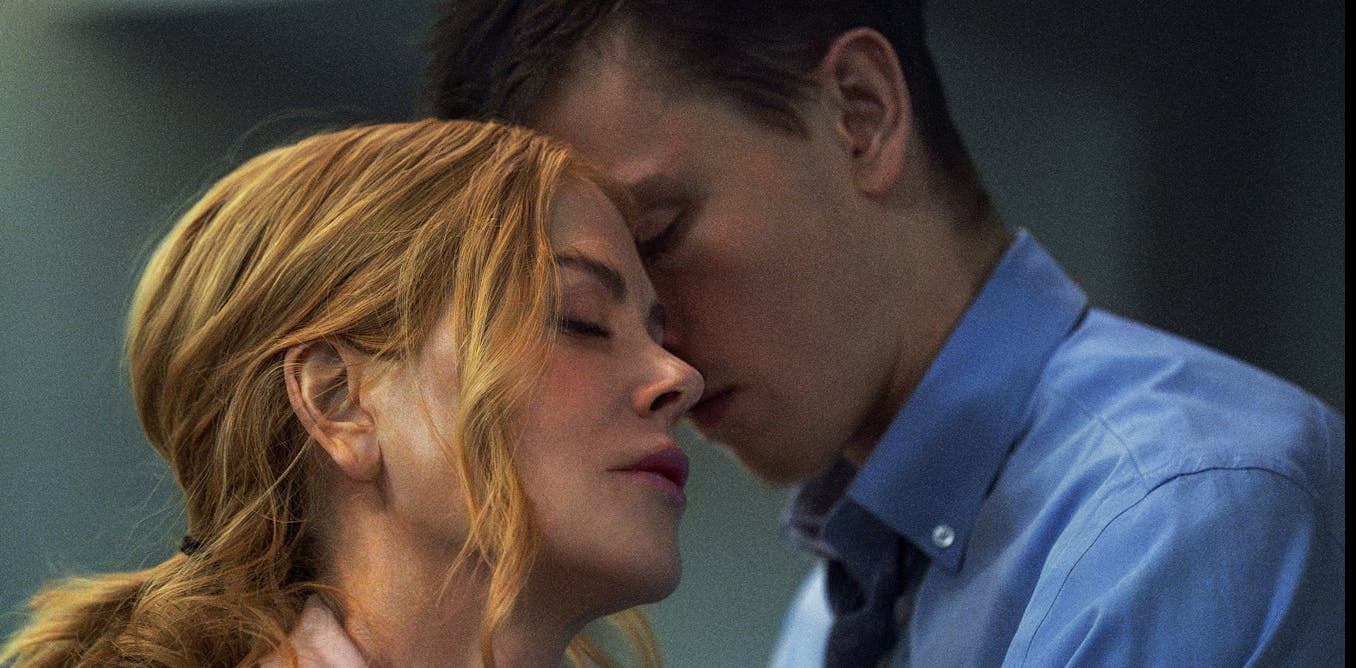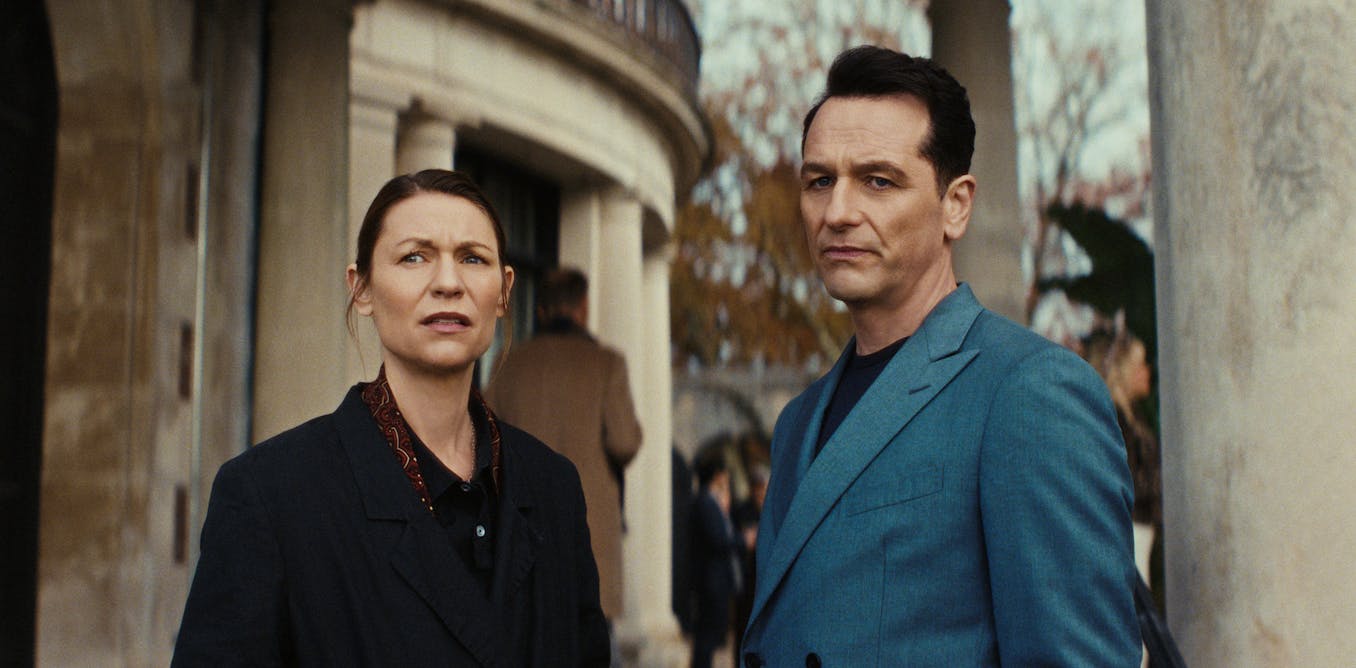Hollywood has recently released multiple films about relationships between older women and younger men: Lonely Planet, The Idea of You and A Family Affair. But the movie I’ve been obsessing about is Babygirl.
An erotic thriller about a CEO named Romy (Nicole Kidman) who has a sizzling affair with her young intern Samuel (Harris Dickinson), the movie is inspired by classics like 9½ Weeks and Fatal Attraction. But unlike characters in those pictures, Romy is not a pathetic or pathological femme fatale, nor is her sexual hunger woven into a cautionary tale about women who transgress normative social roles.
Instead, Babygirl is a nuanced exploration of sexual power as a portal of self-discovery for Romy and Samuel. Described by the film’s writer and producer Halina Reijn as a “fairy tale,” the film infuses society’s taken-for-granted institutions like the office, marriage and family with unexpected sensual tension. In doing so, Reijn is challenging mainstream depictions of gender, power and sexuality, given the film’s focus on BDSM, a term used to describe sex that involves dominance, submission and control.
As an anthropologist who studies sexuality and relationships, including age-gap romances, I am curious about what Babygirl contributes to cultural representations of middle-aged women, masculinity and the transformational aspects of kink. Also, why do we love a kink movie?
Recasting middle-aged
Portraying a successful 50-something woman pursuing her sexual fantasies with a man decades younger than herself, Babygirl has a lot to add to the middle-aged revolution that’s underway. Celebrities like actress Halle Berry and physicians like Dr. Jen Gunter have spoken about menopause and the need to change sexist scripts about older women losing their sexuality and social relevance.
We see this on the screen, when Romy strides with a self-assured midlife sensibility. Yet she also gets Botox, which her oldest daughter ridicules her for and Samuel says she doesn’t need. The film critiques our society’s impossible beauty standards that make it hard for older women — even those who are wealthy and seen as conventionally attractive — to not just be themselves, but to also like who they are.
This is a message that resonates with woman in their 40s to 60s. Middle age is a time of reckoning and unravelling in terms of career, kids, family, marriage, sex and the future. Romy struggles with all of this, and along the way she fails, she hurts people, she seems unhinged. Yet, at times, she also glows with the energy of a woman finding a side of herself she thought she might never meet.
Babygirl asks us to consider what happens when women carry risk and desire across the river of expectations we are taught to abide by. Romy puts her shame down and begins to inhabit her shadow side, which is full of awkward anxieties and gnawing excitement. The film doesn’t praise or condone adultery. Rather, we’re asked to imagine Romy as and for herself, stripped of all ascribed roles.
Caring masculinity
The film opens with Romy faking an orgasm with her husband, who she’s never climaxed with, and then scurrying to her laptop to pleasure herself with BDSM porn. This comment about the performativity of sex and orgasm, especially for heterosexual women, and the blindness of the husband to Romy’s real desires rings loudly throughout the film.
This scene contrasts dramatically with Romy’s experiences with Samuel, who embodies a masculinity where strength and vulnerability co-exist to nurture female pleasure in all its forms. Sometimes called “caring masculinity,” this version of manhood flows beneath the storyline in compelling ways.
He understands what Romy seeks — the violence, the high stakes — and helps her get it. At one point, he asks her to undress, which makes her feel afraid. Kidman looks like Venus rising from Sandro Botticelli’s shell in the hotel room, red hair flowing and arms clutching breasts and pubic area. Gently but persistently, Samuel helps remove Romy’s fig leaf, not to rescue or discover who she is, but for her to realize these things for herself.
Samuel needs Romy, too, which he tells her after the father figure dance scene. He says that he scares himself sometimes and asks her to do EMDR (eye movement desensitization and reprocessing) therapy on him. She says no because she’s not a therapist but gladly holds him after he asks her to. It’s a tender request that reflects a masculinity that is strong enough to be held and even stronger to ask.
(A24 via AP)
Why we like kink
The main characters first meet on a sidewalk as an escaped dog runs through the crowd. It bounds towards Romy until Samuel magically controls the animal. They lock eyes and when she discovers that he is one of her company’s interns, she asks how he calmed the dog. He says, slyly: “I gave it a cookie…Why, do you want one?”
That moment captures the initial stage of their dynamic, when the erotic control is in Samuel’s favour as the dominant partner with more kink knowledge. But Romy isn’t weak, and the film does a good job of demonstrating the reciprocal nature of power.
Babygirl also features the darker sides of their bond, including Samuel’s threat to tell people about them, which both terrifies and turns on Romy. They also play destructive mind games with one another, and, to the film’s credit, the characters discuss this.
Perhaps the most compelling part of the film is that is depicts submission as emancipatory for Romy. It’s a kind of freedom for Samuel, too, but she transforms through this experience the most. And, as the final scene reveals, this aspect of her kink relationship extends into her marriage, which is not broken because of her affair. On the contrary, she communicates her desires and preferences to her husband, who no longer shames her but attentively abides.
Romy begins the film like the loose dog on the street — wild, dangerous, wanting to be tamed. The dog reappears in a final scene, where it’s happily petted by Samuel in their first hotel room. A nod to the therapeutic value of discovering how to channel our wild energies.
Middle-aged women are tired of being viewed as selfless mothers, wives, partners and friends who live in a world that’s unforgiving to women who want more than what they’re told they should want. Women need to play and have the courage to lift the bedsheets on our fantasies, as Romy shows us.

The post “The power of kink: An anthropologist reviews ‘Babygirl’” by Treena Orchard, Associate Professor, School of Health Studies, Western University was published on 01/22/2025 by theconversation.com




































Leave a Reply